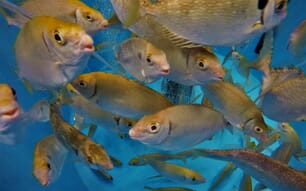Salmon is a species of high ecological and financial importance. Migrating from its freshwater residence in a river out to Sea is a critical step in every young Atlantic salmon's (Salmo salar) life, and a necessity for the salmon to grow to large size.
Researchers have long tried to understand what factors affect the young salmon's decision to migrate out to Sea. Previous studies have indicated that environmental factors such as temperature, light conditions and water flow may play an important role. However, large parts of the within species variation in fish migration remains unexplained.
A study from Umeå University, published in the journal Nature Communications, now shows that the salmon's inclination to migrate is partly limited by its fear of the unknown downstream.
"By treating salmon with an anxiolytic drug, anxiety medication that is, we artificially changed the migration intensity of the salmon where treated salmon travelled further and faster than untreated salmon," says Gustav Hellström, one of the researchers behind the study.
The research team studied how salmon migration was affected both in a lab, where salmon migrated in a large artificial stream, and in a natural stream outside of Umeå in Northern Sweden.
In both environments, researchers found that salmon treated with anxiety medication migrated nearly twice as fast as salmon who had not been subjected to treatment. Several billion animals migrate yearly and the results presented here, i.e. that anxiety limits migration intensity, is not only important for understanding salmon migration but also for understanding migration in general.
The study also has an ecotoxicological dimension as the quantity of medication that the salmon was exposed to was low - in fact so low that it measured lower than that found in wastewater in certain areas.
"Even though salmon in Northern Sweden live in river-systems low to moderately affected by contaminated wastewater it is not very likely that exposure to anxiety medication is an environmental issue for these populations right now. However, given the low dose used in the study we cannot rule out that, with increasing human population and medical use, this might become a problem in the near future," says Gustav Hellström.




